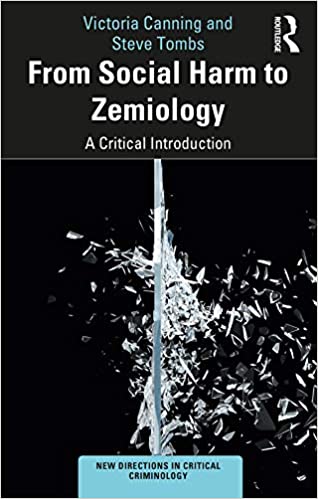This book outlines key developments in understanding social harm by setting out its historical foundations and the discussions which have proliferated since. It examines various attempts to conceptualise social harm and highlights key sites of contestation in its relationship to criminology to argue that these act as the basis for an activist zemiology, one directed towards social change for social justice. The past two decades have seen a proliferation of debate related to social harm in and around criminology. From climate catastrophe and a focus on environmental harms, unprecedented deaths generating focus on border harms and the coronavirus pandemic revealing the horror of mass and arguably avoidable deaths across the globe, critical studies in social harm appear ever more pressing.
Drawing on a range of international case studies of cultural, emotional, physical and economic harms, From Social Harm to Zemiology locates the study of social harm in an accessible fashion. In doing so it sets out how a zemiological lens can moves us beyond many of the problematic legacies of criminology. This book rejects criminologies which have disproportionately served to regulate intersectional groups, and which have arguably inflicted as much or more harm by bolstering the very ideologies of control in offering minor reforms that inadvertently expand and strengthen states and corporations. It does this by sketching out the contours, objects, methods and ontologies of a disciplinary framework which rejects commonplace assumptions of ‘value freedom’. From Social Harm to Zemiology advocates social change in accordance with groups who are most disenfranchised, and thus often most socially harmed.
An accessible and compelling read, this book is essential reading for all zemiologists, critical criminologists, and those engaged with criminological and social theory.
چکیده فارسی
این کتاب با بیان مبانی تاریخی آن و بحثهایی که از آن زمان گسترش یافته است، تحولات کلیدی در درک آسیبهای اجتماعی را تشریح میکند. این تلاشهای مختلف برای مفهومسازی آسیبهای اجتماعی را بررسی میکند و مکانهای اصلی مناقشه را در رابطه با جرمشناسی برجسته میکند تا استدلال کند که اینها بهعنوان پایهای برای یک زیمولوژی فعال عمل میکنند، چیزی که به سمت تغییر اجتماعی برای عدالت اجتماعی هدایت میشود. در دو دهه گذشته شاهد گسترش بحث های مرتبط با آسیب های اجتماعی در جرم شناسی و پیرامون آن بوده ایم. از فاجعه آب و هوایی و تمرکز بر آسیبهای زیستمحیطی، مرگهای بیسابقهای که بر آسیبهای مرزی تمرکز میکنند و همهگیری ویروس کرونا که وحشت مرگهای جمعی و مسلماً قابل اجتناب در سراسر جهان را آشکار میکند، مطالعات انتقادی در آسیبهای اجتماعی بیش از پیش ضروری به نظر میرسند.
با تکیه بر طیف وسیعی از مطالعات موردی بینالمللی در مورد آسیبهای فرهنگی، عاطفی، فیزیکی و اقتصادی، از آسیبهای اجتماعی تا زمیولوژی مطالعه آسیبهای اجتماعی را به شیوهای قابل دسترس نشان میدهد. در انجام این کار نشان می دهد که چگونه یک لنز زیمولوژیک می تواند ما را فراتر از بسیاری از میراث های مشکل ساز جرم شناسی سوق دهد. این کتاب جرمشناسیهایی را رد میکند که به طور نامتناسبی برای تنظیم گروههای متقاطع خدمت کردهاند، و مسلماً با تقویت ایدئولوژیهای کنترل در ارائه اصلاحات جزئی که ناخواسته دولتها و شرکتها را گسترش و تقویت میکنند، به همان اندازه آسیب وارد کردهاند. این کار را با ترسیم خطوط، اشیاء، روشها و هستیشناسی یک چارچوب انضباطی انجام میدهد که مفروضات رایج «آزادی ارزش» را رد میکند. از آسیب اجتماعی تا زمیولوژیاز تغییرات اجتماعی مطابق با گروههایی که بیشترین محرومیت را دارند و بنابراین اغلب از نظر اجتماعی آسیب دیدهاند، حمایت میکند.
خواندنی در دسترس و جذاب، این کتاب برای همه زمست شناسان، جرم شناسان انتقادی و کسانی که با نظریه جرم شناسی و اجتماعی سروکار دارند ضروری است.
ادامه ...
بستن ...
ISBN-13: 978-1138366091
ISBN-10: 1138366099
ادامه ...
بستن ...










